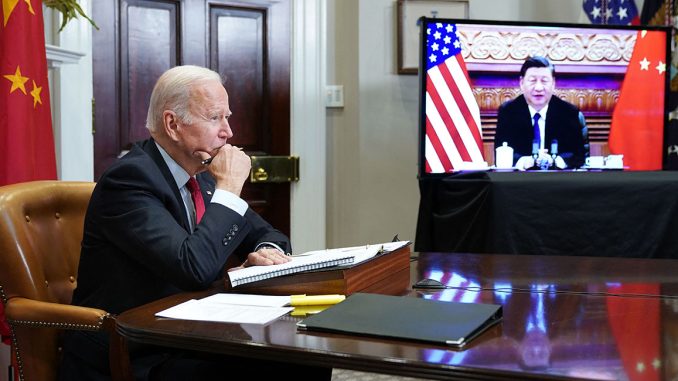
The world is an increasingly dangerous place as we limp further into 2023. It is made only more so by the growth of nuclear weapons or technology in the hands of dangerous regimes such as Russia, China, North Korea, and Iran.
Yet despite this frightening fact, President Joe Biden made no mention of nuclear proliferation problems Tuesday night in his State of the Union address.
Could the issue of nuclear weapons have slipped his mind?
Hard to believe it did.
But if that inexplicably occurred, let’s take a few minutes to remind the commander in chief of the growing nuclear threat we face from these four countries—none of which can be considered friendly to the United States or its interests.
Let’s take a look, one by one.
Russia: Russia has the world’s largest nuclear arsenal. Along with the U.S., Russia is limited by treaty to 1,550 deployed strategic nuclear warheads. But Moscow also has as many as 2,000 (smaller) tactical nuclear weapons, which dwarfs U.S. and NATO stocks by a ratio of 10-to-1.
Unfortunately, Russia’s stalled war on Ukraine increases the possibility of the first use of nuclear weapons since 1945, especially the use of a tactical nuclear weapon to change the course of Moscow’s armed conflict with Kyiv.
Although the risk of nuke use in Ukraine is low, it’s not zero.
Also raising concerns are allegations that Russia is in breach of the New Strategic Arms Reduction Treaty (aka New START) between Russia and the U.S.
Russia is refusing to allow on-site inspections, preventing the United States from verifying compliance with the Obama-era arms treaty.
China: To support its grand geopolitical ambitions, Beijing is building up its nuclear arsenal—and quickly. China is on a trajectory to compete with both the United States and Russia in the nuclear arena.
Indeed, the Pentagon just informed Congress that China has surpassed the U.S. in land-based intercontinental-range ballistic missile launchers, building hundreds of land-based missile silos in recent years.
Although this reflects only the number of launchers, not missiles, the Pentagon also warned late last year that the number of Chinese nuclear warheads could increase to 1,500 by 2035, closing the gap with both Washington and Moscow.
Iran: Tehran has cast aside the deeply flawed Joint Comprehensive Plan of Action—aka the Iran nuclear deal—and is on the verge of a nuclear breakout, possibly being able to build several bombs in a short time if it decides to do so.
Iran’s Islamist regime also has the Middle East’s largest missile arsenal, including ballistic and cruise missiles and armed drones. At some point, this stockpile could become nuclear capable and able to attack U.S. allies (e.g., Israel), friends, and partners in the Middle East and in southeastern Europe.
Should Iran cross the nuclear threshold, the U.S. then would face the world’s most active state sponsor of terrorism (e.g., Hamas and Hezbollah) in possession of the world’s most terrifying weapon.
North Korea: At some 90 launches,Pyongyangtested more ballistic missiles—many likely nuclear capable—in 2022 than in any other year previously. In January, Pyongyang called for an “exponential” growth in North Korea’s nuclear arsenal.
Equally alarming, analysts have assessed that dictator Kim Jong Un’s regime could conduct another nuclear test—the first since 2017—any time now. This not only would test and improve North Korea’s arsenal, but serve as a threatening political signal toward the U.S. and South Korea.
On top of Russia and Iran’s violation of nuclear arms treaties, China won’t engage with the U.S. on nuclear issues, nor is North Korea willing to come to the negotiating table to discuss its burgeoning nuclear and missile programs.
That’s concerning.
Equally troubling is that Biden failed to address these thermonuclear-sized issues in his second State of the Union address.
Considering the radioactive stakes, Mr. President, now isn’t the time for whistling past the nuclear graveyard.
Have an opinion about this article? To sound off, please emailletters@DailySignal.com and we’ll consider publishing your edited remarks in our regular “We Hear You” feature. Remember to include the url or headline of the article plus your name and town and/or state.

